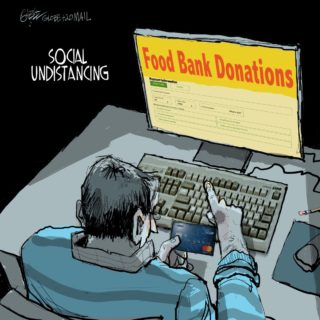Vaccine hesitancy, fuelled by misinformation and conspiracy theories, led to thousands of unnecessary deaths and hospital stays and cost the health care system at least $300-million during two COVID-19 waves in 2021, according to a report that highlights the urgent risk to society of such false claims.
The report, based on the work of an expert panel and published Thursday by the Council of Canadian Academies (CCA), a non-profit organization based in Ottawa, shows how misinformation is eroding trust in public institutions and exacerbating health crises.
“It’s pretty clear that tens of thousands of preventable hospitalizations did occur because of misinformation,” said Alex Himelfarb, chair of the expert panel and former clerk of the Privy Council. “We are confident those are conservative estimates.”
The harms of misinformation chronicled in the report include those faced by individuals, such as illness and death from vaccine-preventable diseases and poisoning from unsafe products. There are also many harms to society, the report says, including lack of adherence to health measures, disease outbreaks and social divisions that can lead to violence, of which racialized communities are particularly vulnerable.
“We are all susceptible to misinformation and vulnerable to its harms, both personally and collectively,” the expert panel states in the report. “The task of confronting misinformation and mitigating its impacts can feel overwhelming and impossible, but we are not in a position to turn away.”
Misinformation has become an increasingly discussed topic during the pandemic, as debate over COVID health measures spilled over into anger and division that encouraged the spread of false claims.
Earlier this month, the College of Physicians and Surgeons of Ontario announced it would be moving its hearings online as a result of abuse, violence and threats. The regulator, along with many others across the country, have been targeted for disciplining doctors who promote misinformation online or to patients.
The CCA report describes how purveyors of misinformation appeal to human emotions and use simple, clear statements to manipulate and persuade audiences. While misinformation comes from many sources, social media and private messaging apps have become dominant distribution channels, with companies having an incentive to drive user engagement, in many cases despite the veracity of the information being sent.
“Social-media companies primarily generate revenues by selling advertising space, the value of which is driven by users’ engagement on the platform,” the report said.
The authors of the report created a model to quantify the harms caused by misinformation during the COVID pandemic. They used publicly available data on vaccination rates and attitudes toward vaccination to estimate how many deaths, hospital admissions and infections could have been prevented if more people had rejected pandemic conspiracy theories and gotten vaccinated.
They focused on March 1 to Nov. 30, 2021, a time before the Omicron variant was dominant and vaccines were still highly effective against both infection and severe illness.
The researchers estimate that misinformation led about 2.35 million Canadians to avoid or decline vaccination during that period. If those individuals had chosen to get vaccinated, it would have prevented about 200,000 COVID cases, 13,000 hospital admissions, 3,500 ICU admissions and 2,800 deaths. It also could have saved the health care system $300-million in hospital costs.
The calculation didn’t account for additional costs, such as physician visits, long-COVID cases, the added burden on surgical backlogs or lost productivity in the workplace.
The report recommends urgent action to recognize the seriousness of misinformation and adopt strategies to combat it. Some proven mechanisms include fact-checking, improved public education and media literacy and more effective science communication.
Stephan Lewandowsky, panel member who is also professor in the school of psychological science at the University of Bristol in Britain, said the stakes are high when it comes to tackling misinformation. The ubiquitous nature of false information and misleading claims is manipulating members of society, he said, and making it difficult for people to understand the difference between truth and lies, which puts everyone at risk.
“If people are misinformed, what is happening really is that the public is being denied the right to be informed about the risks they are facing,” he said. “To me, that’s a very serious matter.”
CARLY WEEKS
HEALTH REPORTER
The Globe and Mail, January 26, 2023

